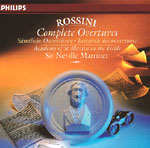Bet you didn’t know that there were enough Rossini overtures to fill three compact discs, did you? Well, here they are, all 28 of them. What’s that you say? Rossini wrote nearly 40 operas? Right you are, but as we all know, the composer was not above recycling his material when it suited him. So, Il Turco in Italia later became part of Otello, and Elisabetta (not included here) originally was Il barbiere di Siviglia. But these are minor points. What’s really important here is the opportunity to follow the progressive development of Rossini’s craft and to hear how he expanded the structure of the overture from sonata form (Sinfonia a Conventello) to symphonic poem (Guillaume Tell). Along the way Rossini also moved in the direction of the operatic prelude segueing right into the action (as in Ricciardo e Zoraide, which includes the opening chorus), a form that would be taken up by Meyerbeer, Wagner, and Verdi.
Given the scope of this project, it’s amazing how Neville Marriner and the Academy orchestra maintain stylistic consistency, sounding fresh all the while. To be sure, there are more exciting performances of some of the individual numbers–Bernstein in Guillaume Tell, Reiner in Barber of Seville, Levi in Semiramide–but overall Marriner’s performances are quite accomplished. (Besides, none of those guys had to contend with all 28.) Philips’ 1970s analog recordings are well-balanced, but a bit on the dry side. So if you want a comprehensive survey of Rossini’s oeuvre–without all the singing–this handsome Musical Heritage Society release will gild your lily.
































